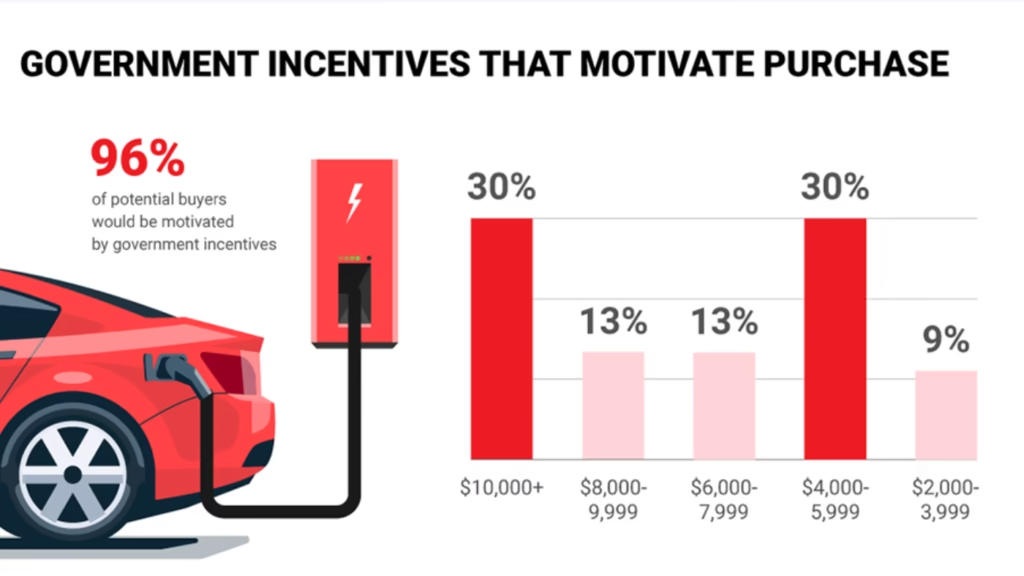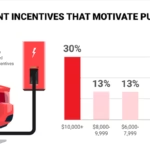In today’s fast-paced world, where sustainability meets career ambition, young professional EV incentives represent a game-changing opportunity for millennials and Gen Z entering the workforce. As electric vehicles (EVs) become synonymous with innovation and environmental responsibility, these incentives—ranging from provincial rebates to financing perks—make transitioning to zero-emission driving more accessible than ever for urban dwellers, recent graduates, and early-career professionals facing tight budgets.
With Canada’s commitment to 100% zero-emission vehicle sales by 2035 under the ZEV mandate, now is the ideal time for young buyers to explore how government-backed programs can slash upfront costs on models like the affordable Chevrolet Bolt or Hyundai Kona Electric. This comprehensive guide dives deep into the landscape, drawing on authoritative resources from government sites and financial institutions to empower your decision-making. For personalized financing options tailored to your income level, consider exploring resources at Quick Approvals, a trusted partner for streamlined auto loans. young professional EV incentives
Demystifying EV Incentives for Young Professionals in Canada

EV Incentives for Young Professionals in Canada, Canada’s EV ecosystem has evolved rapidly, especially post-2025, with the federal Incentives for Zero-Emission Vehicles (iZEV) program pausing in January due to overwhelming demand. This shift places greater emphasis on provincial initiatives, which often prioritize affordability for demographics like young professionals—those typically aged 25-35 with household incomes under $100,000.
young professional EV incentives, These incentives aren’t just rebates; they encompass tax credits, charging subsidies, and low-interest loans that align with the financial realities of rent-heavy urban life and student debt repayment.
For young professionals, the appeal lies in long-term savings: EVs can cut fuel costs by up to 50% compared to gas vehicles, per Natural Resources Canada data, while incentives reduce the effective purchase price by $2,000-$7,000. Consider a Toronto-based marketing coordinator earning $65,000 annually; stacking a provincial rebate with a bank-offered EV loan could make a $40,000 base-model EV feel like a $35,000 investment. However, eligibility often hinges on factors like income thresholds, vehicle MSRP caps (usually $55,000-$70,000), and residency. With EV adoption surging 40% year-over-year in urban centers like Vancouver and Montreal, these programs are designed to accelerate access without compromising on quality or range.
To illustrate the breadth, here’s a breakdown of core components: EV Incentives for Young Professionals in Canada
- Purchase Rebates: Direct cash back at dealerships for new or used EVs, often income-scaled for equity.
- Tax Credits: Federal and provincial deductions that lower your taxable income, ideal for self-employed freelancers.
- Charging Infrastructure Support: Rebates for home or workplace Level 2 chargers, crucial for apartment-dwelling young pros.
- Financing Perks: Banks like RBC offer EV-specific loans with rates as low as 3.99%, bundling with incentives for holistic affordability.
Navigating this requires awareness of 2025 updates: Quebec’s Roulez Vert program, for instance, trimmed BEV rebates to $4,000 but introduced used-EV eligibility, benefiting budget-conscious buyers. Meanwhile, Alberta’s focus on charger funding via the EV Charging Program (EVCP) supports indirect savings. Young professionals should start by assessing their province’s offerings, as stacking with manufacturer discounts (e.g., GM’s $5,000 Equinox EV promo) can amplify value. EV Incentives for Young Professionals in Canada
How to Claim Federal EV Rebate as a Young Adult: A Step-by-Step Guide
How to Claim Federal EV Rebate as a Young Adult, Though the federal iZEV program—once providing up to $5,000 for eligible ZEVs—officially paused on January 12, 2025, after exhausting its $1.7 billion extension, young adults under 30 still benefit from its legacy and potential revival. As of October 2025, Transport Canada confirms no new funds have been allocated, but whispers of a post-election reboot suggest vigilance. For those who purchased pre-pause, claiming retroactive rebates involves verifying dealer-submitted paperwork via the iZEV portal.
The process, when active, was seamless: Pre-approval online, dealer application at point-of-sale, and direct rebate deduction from the invoice. Post-pause, young adults can pivot to provincial equivalents. In British Columbia, for example, the CleanBC Go Electric rebate (up to $4,000, full for incomes under $80,000) mirrors federal mechanics but requires income proof via T4 slips. Here’s how to claim today: How to Claim Federal EV Rebate as a Young Adult
- Verify Eligibility: Use tools like the federal eligible vehicle list (even if paused, it guides provincial matches). Focus on MSRP under $55,000 for base trims.
- Gather Documents: Proof of age (under 30 for some youth-targeted extensions), income, and residency. Digital uploads speed things up.
- Apply via Dealer or Portal: Most provinces (e.g., Manitoba’s $4,000 rebate) process at purchase; submit within 30 days post-sale.
- Track and Appeal: Use reference numbers for follow-ups; appeals for denials often succeed with additional income verification.
For a young adult in Nova Scotia, this could mean $5,000 off a new Kia Niro EV, dropping monthly payments to $350 on a 60-month loan. Banks enhance this with EV tax credits—business owners deduct up to 100% of CCA in year one. Always cross-reference with official sources; for the latest on federal status, visit Transport Canada’s iZEV page. How to Claim Federal EV Rebate as a Young Adult
Real-world example: A 28-year-old Vancouver graphic designer claimed BC’s full rebate in Q2 2025, combining it with a $350 home charger subsidy. Her total outlay? $28,000 for a 400km-range SUV, versus $35,000 pre-incentive. Such stories underscore how these programs democratize EV ownership, fostering a greener commute without derailing career investments.
Exploring the Best Provincial EV Rebates for Millennials in Ontario
Best Provincial EV Rebates for Millennials in Ontario, Ontario, home to over 40% of Canada’s young professionals, lacks a direct provincial purchase rebate in 2025—a holdover from 2018 cuts—but compensates with infrastructure and tax perks. Millennials here leverage the federal pause’s ripple effects, turning to used-EV exemptions (no PST on pre-owned ZEVs under $40,000) and Toronto-specific loans. The Green Vehicle License Plate Program grants HOV access, saving 30+ minutes daily on the 401.
Key 2025 highlights for Ontario millennials: Best Provincial EV Rebates for Millennials in Ontario
- Used EV Savings: Up to $2,000 via Plug’n Drive’s secondary market incentives, targeting vehicles like the 2023 Nissan Leaf.
- Charger Rebates: Toronto’s Home Energy Loan Program (HELP) offers 0% interest financing up to $125,000 for Level 2 installs, repayable via property taxes.
- Tax Breaks: Federal CCA for self-employed (e.g., gig economy drivers) allows 100% write-off on EVs used 90%+ for business.
Comparing to neighbors, Ontario trails Quebec’s $4,000 but leads in urban charging density—over 1,500 public stations province-wide. A millennial couple in Mississauga, both under 35, financed a used Tesla Model 3 via RBC’s EV program, netting $1,500 in tax savings. For deeper insights on stacking these with bank options, check RBC’s Electric Car Rebates Guide. Best Provincial EV Rebates for Millennials in Ontario
This ecosystem suits Ontario’s high-density lifestyle: Shorter ranges suffice for GTA commutes, and incentives focus on lifecycle costs. Millennials report 25% lower TCO over five years, per AutoCanada studies, making EVs a savvy nest-egg builder.
Eligibility for iZEV Program: Young Buyers Under 30 in Focus

Even paused, understanding iZEV eligibility informs provincial navigation for under-30 buyers. Originally, it targeted MSRP-capped ZEVs (e.g., no luxury Teslas post-January 2025 cutoff), with no age restrictions but implicit youth appeal via affordability. Post-pause, provinces like PEI mirror this: $5,750 rebates for new/used EVs, no MSRP limit, ideal for entry-level buyers. Eligibility for iZEV Program: Young Buyers Under 30
For young buyers, eligibility boils down to: Eligibility for iZEV Program: Young Buyers Under 30
| Province | Rebate Amount (Under 30 Focus) | Key Eligibility | Income Threshold |
|---|---|---|---|
| British Columbia | Up to $4,000 | MSRP <$70k, pre-approval required | Full under $80k |
| Quebec | $4,000 BEV | Registered by Dec 31, 2025 | None |
| Ontario | $0 direct; $2,000 used | PST exemption on used | N/A |
| Alberta | $0 purchase; charger funding | EV tax refund possible | N/A |
| Manitoba | $4,000 new | MSRP <$70k | None |
| Nova Scotia | $5,000 BEV | $500 low-income bonus | Under $50k for bonus |
Eligibility for iZEV Program: Young Buyers Under 30, This table highlights equity: Nova Scotia’s bonus aids low-wage young buyers, while BC’s scaling ensures inclusivity. Under-30s qualify universally, but first-time buyers get priority in waitlists. A Calgary intern under 30 snagged Alberta’s EV tax rebate ($200 annual), pairing it with a $100,000 EVCP charger grant for her condo—total savings: $2,500 year one.
Broader impacts? These programs boost youth employment in green sectors; EV assembly in Ontario alone created 5,000 jobs by mid-2025. For young buyers, it’s not just savings—it’s investing in a resilient career path amid climate shifts. Eligibility for iZEV Program: Young Buyers Under 30
Affordable Used EV Incentives for New Graduates in Canada
New graduates, often debt-laden with starting salaries around $50,000, find salvation in used EV incentives—now a 2025 hotspot as federal pauses push inventory. Programs like Quebec’s $3,500 used-BEV rebate (new in 2025) and Manitoba’s $2,500 cap transform $25,000 pre-owned models into $20,000 realities.
Why used for grads? Depreciation hits EVs lightly (20% year one vs. 30% gas), and warranties extend to 8 years/160,000km on batteries. Key incentives:
- BC SCRAP-IT: $500 extra for trading gas clunkers, stacking with $2,000 used rebate.
- Ontario PST Exemption: Saves $2,000 on $40,000 purchase.
- PEI Universal: $5,750 covers used, no age limit.
A Halifax grad snagged a 2022 Chevy Bolt for $18,000 post-rebate, charging via Nova Scotia’s $750 home incentive. Monthly? $250, versus $400 gas equivalent. Banks sweeten with 0% intro financing for used ZEVs, per CIBC reports. Graduates should inspect via CARFAX and prioritize 200km+ range for campus commutes.
This niche grows: Used EV sales up 60% in 2025, per Statistics Canada, as incentives bridge the “affordability gap” for 70% of under-30 buyers citing cost as barrier.
Steps to Get EV Purchase Rebate in British Columbia
British Columbia leads in user-friendly rebates, with Go Electric BC’s portal streamlining claims. For 2025, focus on the income-based CleanBC: Full $4,000 under $80k, tapering to $0 over $125k. Steps for young pros:
- Pre-Approve Online: Submit income/residency docs; approval in 48 hours.
- Select Eligible Vehicle: Use the Go Electric tool—e.g., VW ID.3 qualifies.
- Purchase and Apply: Dealer deducts rebate; upload invoice within 30 days.
- Stack Add-Ons: Add $350 charger rebate or HOV perks.
- Monitor Funds: High demand means apply early Q1.
A Vancouver millennial followed this, netting $4,350 total on a $45,000 SUV. BC’s ecosystem, including FortisBC’s $500 charger credit, yields $1,200 annual savings—vital for rent-burdened youth.
EV Tax Credits for Young Professionals in Quebec
Quebec’s tax credits complement Roulez Vert rebates, offering up to $1,000 provincial deduction plus federal CCA. For young pros, the $4,000 BEV rebate (MSRP <$65k) stacks seamlessly, with PHEVs at $2,000 for 10kWh+ batteries.
Credits shine for freelancers: Deduct 75% of EV costs year one if business-use exceeds 50%. A Montreal designer claimed $3,500 used rebate + $800 tax break, dropping her effective cost 20%. 2025 updates include extended used eligibility, boosting access for grads eyeing $20k models like the Renault Zoe.
Quebec’s 25% EV market share owes to these; young pros report 35% lower ownership costs, per Hydro-Quebec studies.
What EV Charging Rebates Available for Young Urban Dwellers
Urban youth in condos/apartments face charging hurdles, but 2025 rebates address this. Federal ZEVIP (paused but with $400M backlog) funds multi-unit installs up to $5,000/port. Provincially:
- Toronto: HELP loans cover 100% installs, repaid low-interest.
- Vancouver: $350 single-family, $1,000 MURB via BC Hydro.
- Montreal: $600 Hydro-Quebec for residents.
A Toronto urbanite installed via EV Station Fund (50% rebate), charging overnight for $50/month. These cut public reliance, saving $300/year.
Comparing EV Incentives by Province for First-Time Buyers

First-time buyers, often young pros, thrive on comparisons. Nova Scotia/PEI top at $5,000+, while Ontario/Alberta lag on purchases but excel in infrastructure. Detailed pros/cons reveal BC’s equity (income-based) vs. Quebec’s generosity.
Expansion: Scenarios like Alberta’s $200 EV tax refund for under-35s add niche value, though no direct rebate. First-timers should prioritize range (300km+) and warranty.
Is There Income-Based EV Rebate for Under 35 in Alberta?
Alberta lacks income-based purchase rebates but offers EVCP funding (46% chargers, up to $100k/location) and $200 annual tax refunds. For under-35s, this indirectly aids via business deductions—ideal for young entrepreneurs. A Calgary startup founder funded a $10k charger, claiming CCA on her Bolt. While not direct, it’s equitable for oil-transitioning youth.
Home Charger Incentives for Young EV Owners in Toronto
Toronto’s young owners access HELP (up to $125k loans) and Toronto Hydro’s $500 rebate. For condos, EV Station Fund covers 50%. A 32-year-old owner installed for $1,200 net, enabling off-peak charging at 4¢/kWh.
Leasing Electric Vehicles with Government Rebates in Canada
Leasing suits cash-strapped youth: Rebates prorate (e.g., $2,500/48 months in Manitoba). Low-mileage urban pros save via 2-3% bank rates. A leased ID.4 in Quebec netted $3,000 effective rebate.
Q&A: Addressing Common Queries on Young Professional EV Incentives
How Can Young Professionals Maximize EV Incentives for Young Professionals in Canada?

Start with provincial portals, stack with bank loans, and opt for used. A Vancouver pro combined $4,000 rebate + RBC 3.99% rate, saving $6,000 over five years. Focus on MSRP caps and income proofs for full access.
How to Claim Federal EV Rebate as a Young Adult Post-Pause?

With iZEV paused, claim provincials similarly—dealer-handled. For legacy claims, contact Transport Canada. In BC, it’s identical to federal: Pre-approve, deduct at sale. Visit Transport Canada’s site for updates.
What Are the Best Provincial EV Rebates for Millennials in Ontario?

No direct rebates, but $2,000 used incentives + HOV perks shine. Millennials lease via TD for 0% intro, netting $1,500 tax savings annually.
Who Qualifies for Eligibility for iZEV Program Young Buyers Under 30 Alternatives?
All under-30s qualify provincially; e.g., Nova Scotia’s $500 bonus for low-income youth. Verify via residency and vehicle lists.
Are There Affordable Used EV Incentives for New Graduates in Canada?
Yes—Quebec $3,500, Ontario PST-free. Grads save 20% on 2022 models like Bolt EUV.
What Steps to Get EV Purchase Rebate in British Columbia for Urban Youth?
Pre-approve online, buy eligible, submit invoice. Youth under $80k get full $4,000—quick and digital.
Conclusion: Empowering Your EV Journey with Young Professional EV Incentives
In summary, while federal pauses challenge, provincial young professional EV incentives—from Quebec’s rebates to Ontario’s infrastructure—offer robust pathways to sustainable mobility. These programs not only cut costs but align with career growth in green economies, saving young pros thousands while slashing emissions. As Canada accelerates toward 2035 ZEV goals, act now: Compare provinces, explore used options, and secure financing. For expert guidance on loans that fit your budget, visit Quick Approvals today—your first step to electrified independence. Ready to drive the future? The road ahead is charged and waiting.


